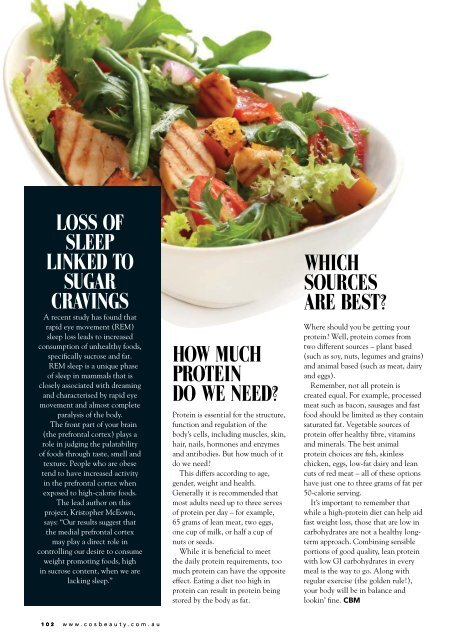CosBeauty Magazine #75
Your Lifestyle, Health & Beauty Bible
Your Lifestyle, Health & Beauty Bible
Create successful ePaper yourself
Turn your PDF publications into a flip-book with our unique Google optimized e-Paper software.
Feature<br />
Loss of<br />
sleep<br />
linked to<br />
sugar<br />
cravings<br />
A recent study has found that<br />
rapid eye movement (REM)<br />
sleep loss leads to increased<br />
consumption of unhealthy foods,<br />
specifically sucrose and fat.<br />
REM sleep is a unique phase<br />
of sleep in mammals that is<br />
closely associated with dreaming<br />
and characterised by rapid eye<br />
movement and almost complete<br />
paralysis of the body.<br />
The front part of your brain<br />
(the prefrontal cortex) plays a<br />
role in judging the palatability<br />
of foods through taste, smell and<br />
texture. People who are obese<br />
tend to have increased activity<br />
in the prefrontal cortex when<br />
exposed to high-calorie foods.<br />
The lead author on this<br />
project, Kristopher McEown,<br />
says: “Our results suggest that<br />
the medial prefrontal cortex<br />
may play a direct role in<br />
controlling our desire to consume<br />
weight promoting foods, high<br />
in sucrose content, when we are<br />
lacking sleep.”<br />
How much<br />
protein<br />
do we need?<br />
Protein is essential for the structure,<br />
function and regulation of the<br />
body’s cells, including muscles, skin,<br />
hair, nails, hormones and enzymes<br />
and antibodies. But how much of it<br />
do we need?<br />
This differs according to age,<br />
gender, weight and health.<br />
Generally it is recommended that<br />
most adults need up to three serves<br />
of protein per day – for example,<br />
65 grams of lean meat, two eggs,<br />
one cup of milk, or half a cup of<br />
nuts or seeds.<br />
While it is beneficial to meet<br />
the daily protein requirements, too<br />
much protein can have the opposite<br />
effect. Eating a diet too high in<br />
protein can result in protein being<br />
stored by the body as fat.<br />
Which<br />
sources<br />
are best?<br />
Where should you be getting your<br />
protein? Well, protein comes from<br />
two different sources – plant based<br />
(such as soy, nuts, legumes and grains)<br />
and animal based (such as meat, dairy<br />
and eggs).<br />
Remember, not all protein is<br />
created equal. For example, processed<br />
meat such as bacon, sausages and fast<br />
food should be limited as they contain<br />
saturated fat. Vegetable sources of<br />
protein offer healthy fibre, vitamins<br />
and minerals. The best animal<br />
protein choices are fish, skinless<br />
chicken, eggs, low-fat dairy and lean<br />
cuts of red meat – all of these options<br />
have just one to three grams of fat per<br />
50-calorie serving.<br />
It’s important to remember that<br />
while a high-protein diet can help aid<br />
fast weight loss, those that are low in<br />
carbohydrates are not a healthy longterm<br />
approach. Combining sensible<br />
portions of good quality, lean protein<br />
with low GI carbohydrates in every<br />
meal is the way to go. Along with<br />
regular exercise (the golden rule!),<br />
your body will be in balance and<br />
lookin’ fine. CBM<br />
102 www.cosbeauty.com.au


















